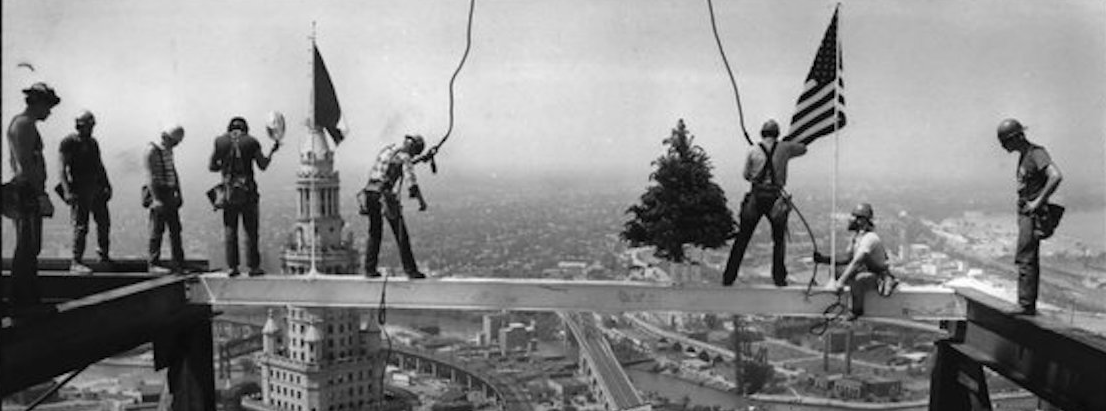Plain Dealer article written by Bob Rich that ran on July 16, 1995
LOG CABIN HERO CARTER HELD SETTLEMENT
Plain Dealer, The (Cleveland, OH) – Sunday, July 16, 1995
Author: BOB RICH
In the spring of 1797, a remarkable man named Lorenzo Carter brought his family from Vermont to the tiny pioneer settlement of Cleveland. Founder Moses Cleaveland had taken his surveying crew from the Connecticut Land Co. back home in October the year before and would never return to his namesake village. It would be up to Carter and a few others whether Cleveland survived into the turn of the century.
Carter, 6 feet tall, was considered a giant. He had a swarthy complexion and black hair that hung down to his shoulders; also, a reputation for hunting, tracking, shooting and being very good with his fists – and quick to use them.
Lorenzo Carter and family would stay on the bank of the Cuyahoga River when others that straggled in during the next few years left the swampy, malarial-ridden area for higher, healthier grounds.
On paper, Cleveland, with its river from the interior to Lake Erie, should have been the ideal distribution point for the whole Western Reserve, but the river just barely flowed into the lake, choked by silt and sand of the harbor. Even Carter’s brother-in-law couldn’t take the malarial shakes and chills and left. Until April 1800, the Carters were the only white family left in Cleveland town.
Lorenzo Carter built a large log cabin, with two rooms and a spacious garret, and started a ferry at the foot of Superior St. When the Indians came to his cabin “under the hill” with their furs to trade, he had goods such as calico and trinkets for the women and he had what the braves wanted most – whiskey.
People used to say that he was all the law that Cleveland had, and he was soon appointed a constable and later a major of militia by the territorial governor.
As the stories go, any tough who rode into this little frontier clearing felt compelled to try himself out bare-knuckled, against Carter. And the major never lost.
One day, he returned from a hunt to find that a party of thirsty Indians had broken into his warehouse and gotten into the whiskey barrel. Carter exploded, slapped the drunks around, kicked several into the swamps, and promptly forgot about the incident. The braves didn’t. Two of their best marksmen ambushed him in the woods, took their shots and missed. The major didn’t.
After that, the Indians figured he was immortal and often called on him to judge their tribal feuds. He spoke several of their dialects.
He wasn’t admired by everybody. Solid New England Yankees didn’t like the riffraff that hung out at his cabin saloon. One prominent early settler, lawyer Samuel Huntington, wrote back to Moses Cleaveland in 1802 that Carter “gathers about him all the itinerant Vagabonds that he meets with, out of whom he gets all his labour done for their board and Whiskey; over whom he has an absolute control – organizing a phalanx of Desperadoes and setting all Laws at defiance.” And there was perhaps some jealousy involved at his cornering the Indian fur trade.
And yet it was Carter, with his rifle and dogs, who, when every member of the tiny village was down with malarial fever and chills, brought in the wild game to feed them.
He was no civil libertarian, but he didn’t like slavery. When a canoe upset in Lake Erie in the spring of 1806, drowning a white family in the frigid water, the only survivor was a black man, Ben, who was cared for at Carter’s cabin until the fall when two Kentuckians rode in and claimed that he had been their slave.
Carter told Ben that he didn’t have to go back to Kentucky, but Ben talked to his former masters and agreed to go back with them. By the time the small party got to Newburgh, two of Carter’s friends appeared with rifles. “Ben, you damned fool, jump off that horse and take to the woods!” said one. Ben jumped, made it to the woods and presumably to Canada and freedom; the Kentuckians ran the other way.
With all the mixed feelings about Lorenzo Carter, his spacious cabin was the social center, schoolhouse, jail and inn for an area that by 1810 had grown to only 300 people in the entire township. When 16 of Cleveland’s 18 families formed a lending library in 1811, Carter kept Goldsmith’s “History of Greece” and “Don Quixote” out so long that he had to pay a dollar apiece in fines. Apparently, there was a touch of intellect to the man of action.
Movies and books continue to pour out endless Daniel Boone and Wyatt Earp stories. Yet in Cleveland, was just such a frontiersman and adventurer – a man who left his enduring mark on a struggling community by surviving and showing others how to survive.
There’s no statue of Lorenzo Carter in Public Square to go with founder Moses Cleaveland’s.
But he was the first of the remarkable men and women who would force-feed the new, infant village into the brawling giant it became many years later.
